In recent years in Albanian due to liberalisation of energy market, the built of small hydropower plants (SHP)’s placed at the focus of private investitors. In this paper we will study the impact of Arras small hydropower plant which is built at Diber regional in Albanian power system such as energy efficiency and improvement of voltage level. This study is focused at a part of power system namely Diber area. From the analysis in the case of small hydropower plant connections with power system results in an improvement of voltage level, increasing the efficiency of power system and reduces significantly power transmission losses. We have achieved a model of a part of power system and we have calculated the power flow, level of voltage in different nodes and the transmission power losses of the system with NEPLAN software.
Keywords |
| Energy Efficiency, Small Hydropower Plants, Power Losses, Voltage Level |
INTRODUCTION |
| Over 90% of Albanian electricity is produced by hydropower plants (HPPs). HPPs, mainly are located at north Albania
and are built on Drin and Mat rivers with 1446 MW capacity. The hierarchal scheme of power system before built
small hydropower plants was radial, means that the power flow unidirectional. The load is concentrated at medium and
south Albania. Due this reason the power quality, mainly south Albania area is not at good and optimal conditions. It
seems at low voltage levels of nodes in this part of Albania and significant transmission power losses [1]. Also during
winter season when the demand pulls in the pick, the transmission lines are loaded at maximal capacity. This has done
to have frequent interruptions of electricity supply to consumers due to overloaded lines and various defects [2]. |
| However, liberalization of the electricity industry in some areas has contributed to the development of small
hydropower generating capacity by independent power producers [1]. In recent years, the interest of building small
hydropower plants by operators working in the field of energy production is increased. These resources are usually
connected at the distributed power system. The term “small hydropower plant” (SHP) is commonly used to refer to
hydropower with capacity less than 10 MW [3]. Other terms that are normally used are mini hydropower for SHP with
capacity between 100 kW and 1 MW and micro hydropower for SHP with capacity below 100 kW [3]. The power
generated from SHP is quite large. The use of hydroenergytic reserves through construction of small hydropower
plants, has not only the increase of the production of electricity but also some other too important advantages [4] In last
year’s in Albania are built several small hydropower plants with a total capacity about 200MW [1]. Small hydropower
plants built in Albanian have been contributed to improve power quality, to reduce total power losses in transmission
line and to increase efficiency of electricity consumption. Power generation from small hydropower plants is directly
linked to the strategic objectives for the evaluation and development of hydropower capacity unused in Albania through
private investment partnership or concessionary schemes [1].The presence of local generation in a distribution system
will affect the distribution system. For example, the distributed generated will alter the power flow in the distribution
system, and the distribution system can no longer be considered as a system with unidirectional power flow [5]. On the
other hand, distribution systems have, for many years, been designed based on the assumption that the power flow is unidirectional. Hence, the presence of the SHPs, will obviously impact the power distribution system operation and
control [6]. |
| The aim of this article is to analyse the impact of New Arras SHP in Diber region. We will analyse the impact of small
hydropower plant, built in Diber district with capacity 4.8 MW. In this zone the before building of SHP the quality of
power is poor. The voltage level is unstable; it has voltage fluctuation, power interruption, no reserve at power
transmission line and power significant losses. After building of New Arras small hydropower plant and connection at
distribution power system, the power quality is improved. The voltage fluctuations, the power transmission losses are
reduced, and the power line capacity reserve, the efficiency of power system are increased. The building of New Arras
small hydropower plant not only impact in power distribution system, but it has a social impact. The building of New
Arras small hydropower plant has affected directly in the development of the zone and the improvement of road
infrastructure. Also this hydropower plant, built in rural areas, which are with low incoming, has affected in the
reduction of poverty by employing people from this zone. |
CALCULATE THE CURRENT, VOLTAGE DROP AND POWER LOSSES IN A TRANSMISSION LINE |
| In this section we have been analysis the current, power losses and voltage drop in a simple radial system analitically. |
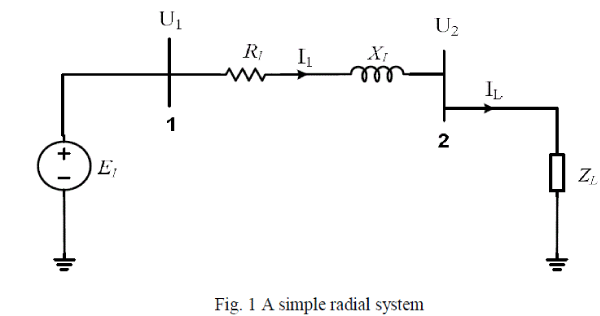 |
| In Figure 1 we present a simple radial system. It consists of a constant voltage source (E1) supplying a load (ZL)
through a series impedance (Z1). |
| The current flow through transmission line I1 is given by follow expression: |
 (1) (1) |
| Where: |
| I1 is the phasor phase current |
| U1 is the phasor phase voltage |
| The magnitude of the current is given by: |
 (2) (2) |
| Whereas voltage value at the node (2), U2 is equal with the following term: |
 (3) (3) |
| The voltage drop in transmission line, we obtain: |
 (4) (4) |
| Power losses in transmission line due to current flow (I1), may be expressed as: |
 (5) (5) |
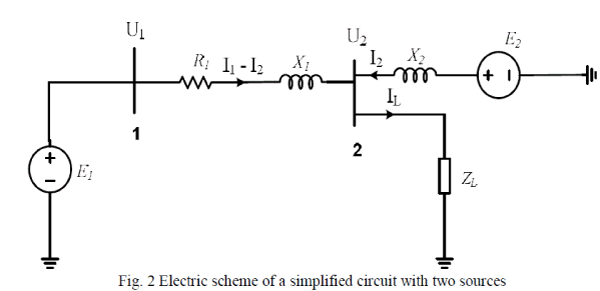 |
| In Fig.2 is represented the same circuit where we have added a source with terminal voltage E2 near the consumer node
(2). Accepting the new source supply the load by current with value I2 and the current load (IL) can be assumed
constant, than the current flow through transmission line (I’1), can be calculated from: |
 (6) (6) |
| Whereas voltage value at the node two is equal with the following term: |
 (7) (7) |
| The voltage drop in transmission line to consider the new condition can be expressed as follow: |
 (8) (8) |
| Power losses in transmission line due to current flow (I’1), may be expressed as: |
 (9) (9) |
| or |
 (10) (10) |
By equation (6) one can see that the current flow in transmission line I’1 compare me current flow I1 before the new
source put in network is reduced. The current value injected by new source is I2. Also from equation (8) we can see that
the voltage drop in transmission line reduce with value I2Z1 and the power losses reduce significantly
about  . In case that the current I2 injected by new sources which is connected at consumer node is
equal with current load IL then the current flow through transmission line, voltage drop and transmission power losses
are zero. . In case that the current I2 injected by new sources which is connected at consumer node is
equal with current load IL then the current flow through transmission line, voltage drop and transmission power losses
are zero. |
IMPACT OF SMALL HYDROPOWER PLANT ON POWER SYSTEM |
| Since small hydropower plants built and connected at power system, power losses are reduced and the voltage profile is
improvement. In order to study of impact of small hydropower plants in power system, we have analysed the Diber
district. The new Arras hydropower plant is built at Diber area and is connected at power system in year 2013. To make
a quantitative comparison we have analysed Diber district before and after of Arras hydropower plant construction. |
THE STATE OF REGIONAL POWER SYSTEM BEFORE ARRAS SHP |
| The Diber district is fed by a 110 kV radial transmission lines from Burrel substation to Peshkopi Downstream the
transmission line Burrel – Peshkopi are connected the substation which fed the Kuç, Bulqiza and Vojnik area. |
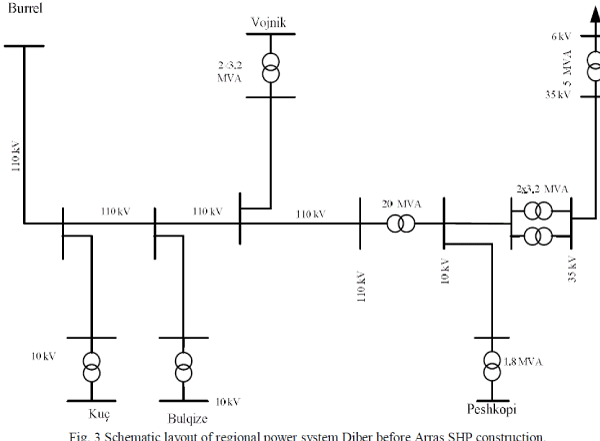 |
| The schematic of regional power system is shown at Fig. 3. From Peshkopi substation a 35 kV lines fed Fushe – Alie
substation. |
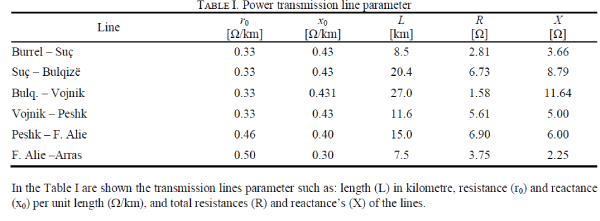 |
| In the Table I are shown the transmission lines parameter such as: length (L) in kilometre, resistance (r0) and reactance
(x0) per unit length (Ω/km), and total resistances (R) and reactance’s (X) of the lines. |
 |
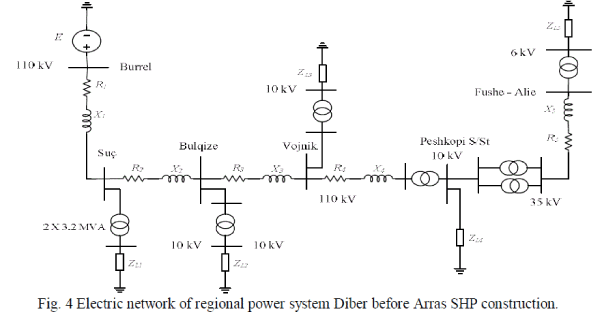 |
| In the Fig.4 the electric network of regional power system Diber before Arras SHP construction is shown. In our
analysis, the transformer power losses are ignoring. The regional power system is analysed at different of loads and in
all transmission lines are calculated the transmission power losses and voltage nodes. The loads are changed from zero
to 100% of nominal power of area. To perform the calculations the NEPLAN software is used. |
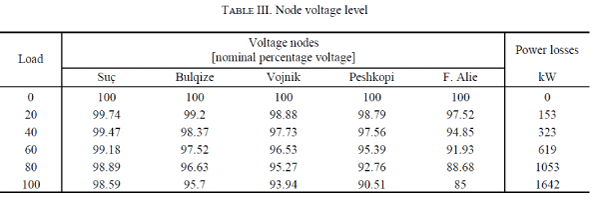 |
| These data are presented at table III. From this table one can see that the voltage levels are below the level allowed by
international standards when the loads increased. The total transmission power losses are significantly increased with
increase of loads, for example when the power system is loaded at nominal power the total losses of transmission lines
are 1642 kW and the voltage level at Fushe – Alie node is 85 per cent of nominal value. Also the transmission lines
Burrel to Peshkopi is loaded at maximum capacity. As a conclusion for the regional power system of Diber we can
state that the voltage levels are under allowed values, the transmission lines are at maximal capacity and we have not
reserve to cover the connection of a new load. |
THE STATE OF REGIONAL POWER SYSTEM AFTER ARRAS SHP BUILT |
| The new hydropower plant at Arras area is connected at power system in year 2013. Its installed capacity is 4.8 MW,
with two Kaplan turbine from 2.4 MW capacity each other. The head of hydropower plant is 200 meters. Through a 10
kV line the Arras hydropower plant is connected with regional power system at Fushe – Alie substations. The length of
line is about 7.5 km. |
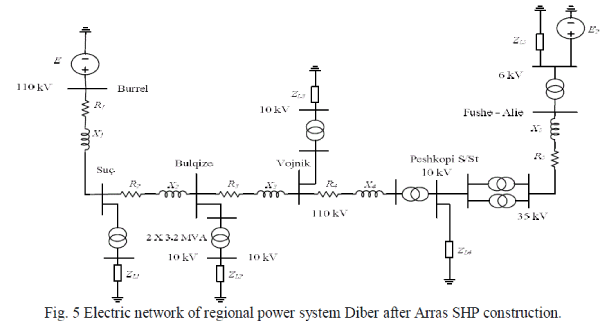 |
| The simplified electrical diagram of regional power system with Arras hydropower plant connected at power system is
show at Fig. 5. The regional power system is analysed at different of loads and different power injected by Arras
hydropower plant. The power losses and voltage nodes are calculated in all transmission lines. The power injected by
new Arras hydropower plant is changed from zero to 100% of its installed capacity. |
 |
| The calculations are presented in Table IV. From the results one can see that the voltage node levels for all nodes of
transmission lines are improved. Also, the power losses at transmission lines are reduced significantly compare with case when the Arras hydropower plant was not connected at power system. At 2013 year, in Diber is connected at
power system another small hydropower plant namely Peshku with capacity 12 MW. Peshku SHP is connected at
Bulqiza bars. |
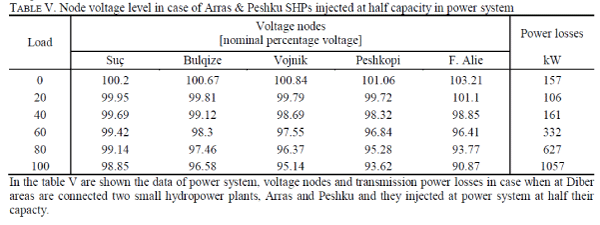 |
 |
| Otherwise in table VI are obtained the data when the Peshku & Arras plants inject in power system at rated capacity. |
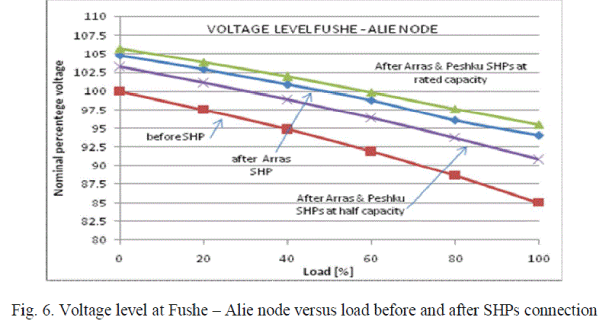 |
| To emphasise the impact of Arras and Peshku small hydropower plants, the voltage node at Fushe – Alie, before and after SHP’s connection at power system, are represented in Fig.6. |
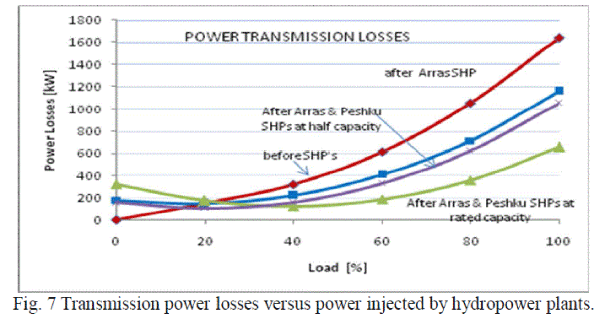 |
| Also, Fig 7 shows the transmission power losses before and after SHP’s connection at power system. From these
figures, it is clearly seen that voltage node level (at Fushe – Alie node) is improved and transmission power losses are
reduced. Also, when new Arras hydropower plant operates at rated capacity the power flow in the transmission lines
that connected Fushe – Alie and Peshkopi substations, changes the direction. It means that the Fushe – Alie substation
behaves as a source and Peshkopi substation acts as source. In addition, a reserve in the transmission line Burrel to
Peshkopi is obtained, so additional power to the regional power system can be transmitted. |
ENVIRONMENTAL AND SOCIAL IMPACT OF SMALL HYDROPOWER PLANTS |
| Hydropower plant energy, as renewable energy, is very friendly with environment. It also has some social and
economical benefits. Small hydropower plants, with deviation canal have a minimal impact in environment. SHPs have
an impact in the improvement of the air quality by reducing released CO2 in atmosphere. On the other hand, small
hydropower plants have an economical impact in the region by employing local residents for service and maintenance.
Also, the construction of a small hydropower plant acts directly in development of local area by improving the road
infrastructure. At Arras hydropower plant are employing around 10 persons from different professions. |
CONCLUSION |
| In this paper the impact of a small hydropower plant s on power transmission losses and voltage profile of distribution
network is presented. |
| The power produced by SHPs is generated at the consumer end, so the possibility to supply the consumers with
affordable power at a higher level of quality is increased. Also, the SHPs reduce the power losses of transmission lines,
increase the capacity and improve the efficiency of power system. |
| SHPs are a priority to produce a green energy, with minimal environmental impact and reduce CO2 in atmosphere.
Small hydropower plant, built in rural areas, which are with low incoming, has affected in the reduction of poverty by
employing people from this zone and to improve the local infrastructure |
References |
- ÃÆÃâ¡elo, M., Zeqo, E., Ibrahimi A., and Bualoti, R., âÃâ¬ÃÅThe Impact of Small HPPâÃâ¬Ãâ¢s in the Energy Balance of Albanian Power SystemâÃâ¬ÃÂ, International Conference on Renewable Energies and Power Quality (ICREPQâÃâ¬Ãâ¢13) Bilbao (Spain), 20th to 22th March, 2013
- KESH, 2006 âÃâ¬Ãâ 2013, Annual Report.
- ESHA (European Small Hydro Association), âÃâ¬ÃÅGuide on How to Develop a Small Hydropower PlantâÃâ¬ÃÂ, 2004.
- Barker, P. P., and De Mello, R. W., âÃâ¬ÃÅDetermining the Impact of Distributed Generation on Power Systems: I. Radial Distribution Systems,âÃâ¬Ã Proceedings of IEEE Power Engineering Society Summer Meeting, Seattle, Vol. 3, 16-20 July 2000, pp. 1645-1656. doi:10.1109/PESS.2000.868775.
- Khoan, T., and Vaziri, M., âÃâ¬ÃÅEffects of Dispersed Generation (DG) on Distribution Systems,âÃâ¬Ã IEEE in Power Engineering Society General Meeting, Sacramento, 16 June 2005,Vol. 3,pp.2173-2178.
- Bastiao F., Cruz, P., and Fiteiro, R., âÃâ¬ÃÅImpact of Distributed Generation on Distribution Networks,âÃâ¬Ã Proceedings of the 5th International Conference on European Electricity Market, Lisboa, 28-30 May 2008, pp. 1-6. doi:10.1109/EEM.2008.4579049.
|